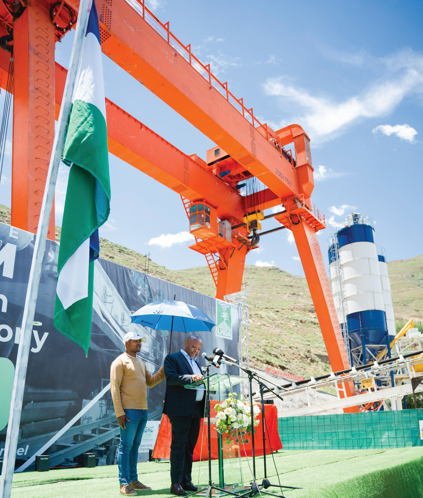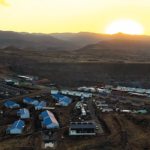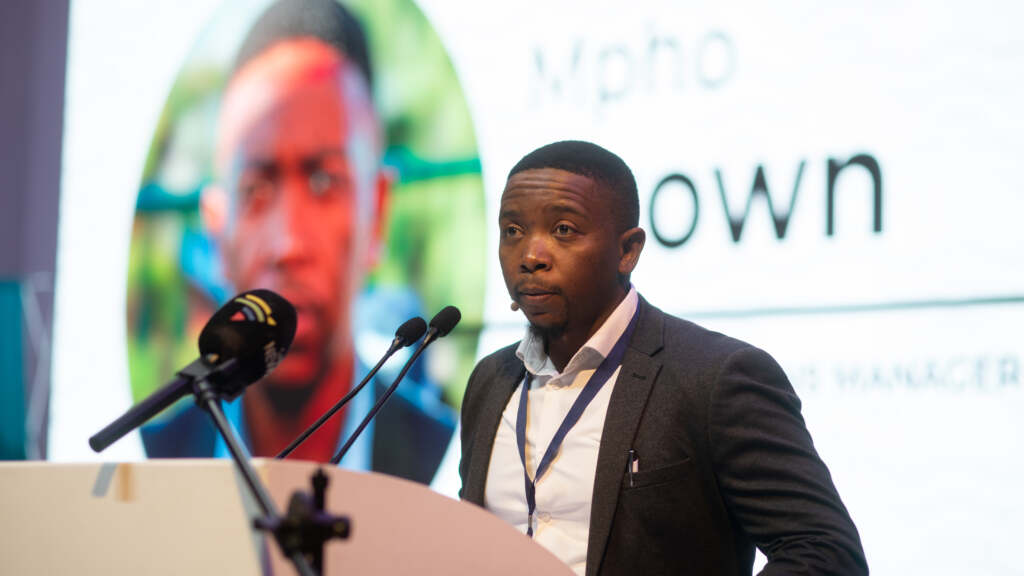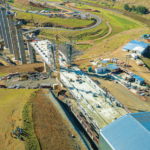Staff Reporter
The bi-national Lesotho Highlands Water Project (LHWP) exemplifies how a single infrastructure initiative can drive broad human development.
Beyond water transfer and power generation, the project has created jobs, developed skills, improved education and healthcare, strengthened businesses, and preserved the environment.
And with Phase II of the project currently underway, the LHWP- aninitiative aimed at collecting and delivering specified quantities of water from Lesotho to address water shortages in South Africa’s Gauteng region while simultaneously generating hydroelectric power for Lesotho- remains a beacon of progress.
Since its inception in 1986, the project has not only fulfilled its primary mission but has also significantly contributed to Lesotho’s economic growth, employment, infrastructure, education, and environmental conservation.
Economic empowerment
One of the LHWP’s most remarkable achievements is its role in driving economic empowerment in Lesotho. The project has injected over M17 billion into the country’s economy through Phase I, with Phase II expected to contribute an additional M53 billion by its completion.
This massive financial influx has spurred job creation, with 16,000 employment opportunities for Basotho in Phase I and 11,000 in Phase II to date. These jobs, spanning both skilled (7,491 positions) and unskilled (3,772 positions) labor, have improved livelihoods and fostered financial stability for thousands of Basotho families.
Speaking during a recent tunnel boring machine (TBM) launch and naming ceremony in Leribe, the Chief Executive of Lesotho Highlands Development Authority (LHDA), Tente Tente gave a brief snippet of the profound impact of the project to date.
“Allow me to share with you the achievements that Phase II has made to date. It has generated over 11,000 employment opportunities for Basotho, with 7,491 skilled and 3,772 unskilled jobs created. We have also paid over M120 million in compensation to 1736 households to date,” Tente said.
Furthermore, the project prioritises local procurement, having spent M1.2 billion on Basotho-owned businesses in Phase I. In Phase II, Basotho businesses have already received M366 million, with significant contributions directed toward companies in the Phase II Project Area, Mokhotlong and Leribe. This investment has supported entrepreneurship, strengthened local industries, and advanced skills development across multiple sectors.
Sustainable revenue generation
Beyond employment and local business growth, the LHWP provides a steady revenue stream for Lesotho. To date, the country has collected over M17 billion in water royalties, generating an average monthly income of M300 million for the country.
The project has to date produced M1.4 billion in revenue through bulk electricity sales to the Lesotho Electricity Company (LEC), with an average annualrevenue of M55 million.
Human development and skills growth
The LHWP has played a pivotal role in equipping Basotho with valuable skills and educational opportunities. Over 1,700 individuals from project communities have completed the LHDA’s Skills Testing and Accreditation Program, with the project set for further expansion.
“I am aware that the communities on this Leribeside of Phase II have had concerns about implementation of some of the programmes that we have already implemented on the eastern side, Mokhotlong.
“I’m sure you will be pleased to note that this year after months of planning we will be launching the Skills Testing and Accreditation programme – which evaluates, accredits, and certifies the skills of candidates, thus opening new employment opportunities in semi-skilled categories in Lesotho and across the SADC region,” Tente said.
Similarly, the LHDA Bursary Program has awarded 16 scholarships since 2018, benefiting 70% Basotho students at a cost of M4.1 million.
In addition, M99.7 million has been invested in skills development initiatives, while the Young Professionals Program has guided 82 graduates into sustainable careers, with 78 currently employed in LHWP-related fields.
Infrastructure and social services development
Infrastructure improvements remain a cornerstone of the LHWP’s legacy. Under Phase I, over 2,000 kilometers of roads were constructed, enhancing connectivity and trade while granting rural communities easier access to essential services.
The project has also made significant contributions to education and healthcare, with 45 classrooms built across 16 schools and five health facilities established to provide critical medical services to rural populations.
In partnership with the Ministry of Health, LHWP Phase II has spent M4.5 million on Health Management Information Systems, capacity building, and community health services, ensuring that the project’s benefits extend beyond economic and infrastructural gains to include long-term improvements in public health.
Environmental conservation and sustainability
As a responsible development initiative, the LHWP integrates environmental conservation into its operations. The project has established protected areas such as Tšehlanyane National Park, Katse Botanical Garden, and Bokong Nature Reserve, safeguarding Lesotho’s biodiversity while promoting eco-tourism and job creation in conservation.
Moreover, the project’s Integrated Catchment Management (ICM) program under Phase II has employed 10,987 Basotho in rangeland and wetland rehabilitation, with M36 million paid in wages in the past couple of years. These efforts help combat land degradation, ensuring that Lesotho’s natural resources remain sustainable for future generations.
Water and sanitation improvements
Water access remains central to the LHWP’s mission, and its impact on local communities has been profound. Through the Water and Sanitation (WATSAN) initiative in Phase I communities, 2,292 households have gained access to potable water systems, while 446 households have received modern sanitation facilities. These improvements have enhanced hygiene, reduced disease prevalence, and improved overall quality of life.
Rural electrification and energy access
In addition to its hydroelectric power contributions, the LHWP has extended energy access through solar electrification projects. Over 208 households in Katse and Mohale villages have been connected to sustainable solar energy, reducing dependence on traditional fuels and enabling economic activities that require reliable power.
Infrastructure expansion and progress
LHWP Phase II continues to advance, with key infrastructure projects nearing completion. Housing and office facilities have been finalized, while new roads connecting Leribe, Thaba-Tseka, and Mokhotlong are set to enhance regional connectivity. The Senqu Bridge, the largest of three spanning the Polihali Reservoir, reached a milestone with the completion of all 15 piers in December.
Additionally, significant progress has been made on the Polihali Dam and Transfer Tunnel. Excavation and rockfill placement for the dam are ongoing, and tunnel boring machines (TBMs) have been introduced to accelerate progress.
The tunnel will facilitate gravity-fed water transfer from Polihali to Katse, further strengthening Lesotho’s role as a key water supplier in Southern Africa.
“At the heart of the Project is the improvement of the livelihoods of our citizens. It is crucial for LHWP to never overlook the significance of restoring the lives of individuals directly impacted by this project,” added Minister of Home Affairs, LebonaLephema on behalf of Prime Minister Samuel Matekane at the TBM launch.
Summary
- And with Phase II of the project currently underway, the LHWP- aninitiative aimed at collecting and delivering specified quantities of water from Lesotho to address water shortages in South Africa’s Gauteng region while simultaneously generating hydroelectric power for Lesotho- remains a beacon of progress.
- Speaking during a recent tunnel boring machine (TBM) launch and naming ceremony in Leribe, the Chief Executive of Lesotho Highlands Development Authority (LHDA), Tente Tente gave a brief snippet of the profound impact of the project to date.
- “I’m sure you will be pleased to note that this year after months of planning we will be launching the Skills Testing and Accreditation programme – which evaluates, accredits, and certifies the skills of candidates, thus opening new employment opportunities in semi-skilled categories in Lesotho and across the SADC region,” Tente said.

Your Trusted Source for News and Insights in Lesotho!
At Newsday Media, we are passionate about delivering accurate, timely, and engaging news and multimedia content to our diverse audience. Founded with the vision of revolutionizing the media landscape in Lesotho, we have grown into a leading hybrid media company that blends traditional journalism with innovative digital platforms.









